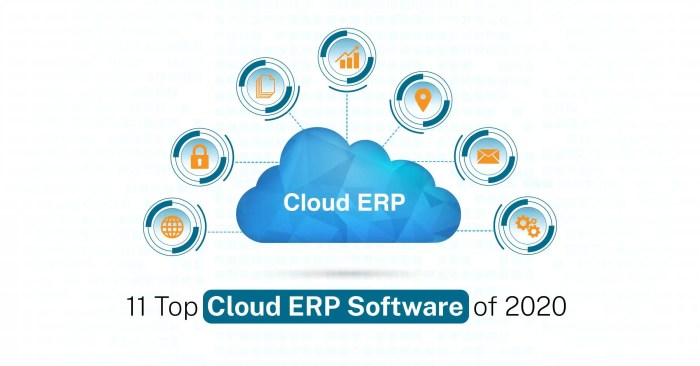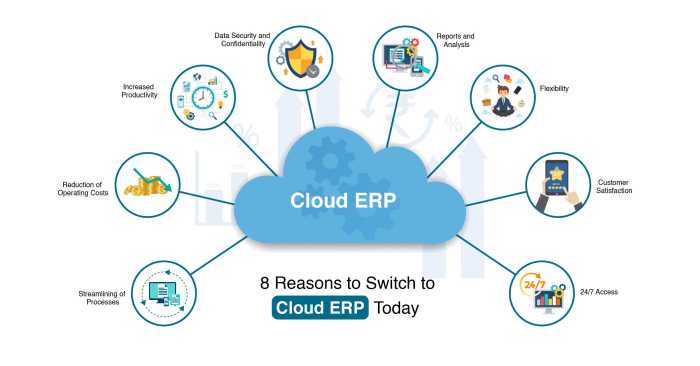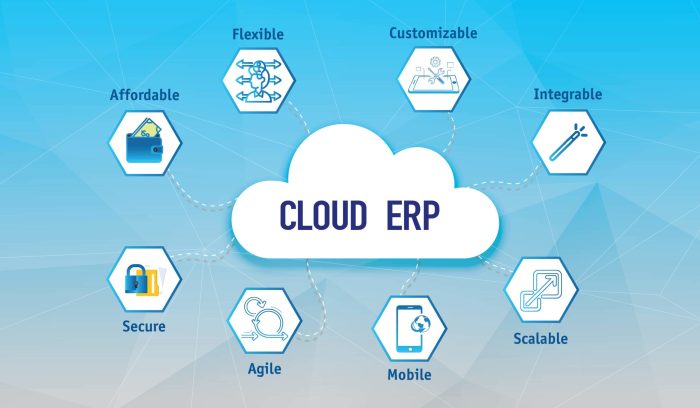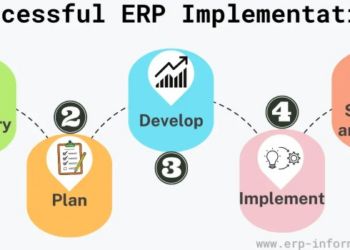Embark on a journey to discover the transformative impact of cloud ERP solutions on modern businesses. From streamlined operations to enhanced efficiency, this technology is revolutionizing the way organizations operate in the digital age.
Definition of Cloud ERP Solutions

Cloud ERP solutions refer to Enterprise Resource Planning software that is hosted on remote servers and accessed through the internet. These systems allow businesses to manage their core operations, such as accounting, human resources, inventory, and customer relationship management, in a centralized and integrated manner.
Key Features and Benefits of Cloud ERP Solutions
Cloud ERP solutions offer several key features and benefits that make them a popular choice for businesses of all sizes. Some of these include:
- Scalability: Cloud ERP systems can easily scale up or down based on the needs of the business, allowing for flexibility and cost-effectiveness.
- Accessibility: Users can access the system from anywhere with an internet connection, enabling remote work and collaboration.
- Cost-Effectiveness: Cloud ERP solutions often require lower upfront costs and reduce the need for in-house IT infrastructure and maintenance.
- Security: Cloud ERP providers invest in robust security measures to protect data from cyber threats and ensure compliance with regulations.
Examples of Industries Using Cloud ERP Solutions
Cloud ERP solutions are widely adopted across various industries, including but not limited to:
- Manufacturing: Streamlining production processes, managing inventory, and tracking supply chain operations.
- Retail: Optimizing sales, inventory management, and customer data to enhance the shopping experience.
- Healthcare: Improving patient care, managing medical records, and ensuring compliance with healthcare regulations.
Implementation of Cloud ERP Solutions

Implementing cloud ERP solutions in an organization involves a series of steps to ensure a successful deployment and integration with existing systems. It is essential to carefully plan and execute the implementation process to maximize the benefits of cloud ERP solutions.
Process of Implementing Cloud ERP Solutions
- Assessment and Planning: The first step is to assess the organization's needs and create a detailed plan for the implementation process.
- Selection of Vendor: Choose a reputable cloud ERP vendor that aligns with the organization's requirements and goals.
- Data Migration: Transfer existing data to the cloud ERP system while ensuring data integrity and security.
- Customization and Configuration: Customize the cloud ERP solution to meet the specific needs of the organization and configure it accordingly.
- Training and Testing: Provide training to users on how to use the new system effectively and conduct thorough testing to identify any issues.
- Go-Live and Support: Finally, launch the cloud ERP solution, provide ongoing support, and monitor its performance to ensure optimal functioning.
Challenges During Implementation and Solutions
- Resistance to Change: Employees may resist adopting new processes. Encourage open communication, provide training, and highlight the benefits of the new system.
- Data Security Concerns: Ensure robust security measures are in place to protect sensitive data. Regularly update security protocols and conduct audits.
- Integration Issues: Ensure seamless integration with existing systems by working closely with IT teams and conducting thorough testing.
- Budget Constraints: Develop a realistic budget and allocate resources effectively. Consider long-term cost savings from using cloud ERP solutions.
Best Practices for Successful Deployment
- Engage Stakeholders: Involve key stakeholders in the decision-making process and keep them informed throughout the implementation.
- Set Clear Objectives: Define clear goals and objectives for the cloud ERP implementation to track progress and measure success.
- Monitor Performance: Continuously monitor the performance of the cloud ERP solution and gather feedback from users to make necessary adjustments.
- Regular Training: Provide ongoing training to ensure users are proficient in using the system and maximize its capabilities.
Customization and Integration of Cloud ERP Solutions
Customizing and integrating cloud ERP solutions is crucial for businesses looking to optimize their operations and align the software with their specific needs.
Importance of Customization
Customization of cloud ERP solutions allows businesses to tailor the software to their unique processes and requirements, ensuring maximum efficiency and productivity. By customizing the system, companies can streamline workflows, eliminate unnecessary steps, and enhance overall performance.
Integration with Existing Systems
Integrating cloud ERP solutions with existing software systems is essential for seamless data flow and collaboration across different departments. This integration ensures that all systems work cohesively, eliminating silos and improving overall data accuracy and accessibility.
Popular Tools and Methods
- API Integration: Application Programming Interface (API) integration is a common method used to connect cloud ERP solutions with other software applications, allowing for real-time data synchronization and communication.
- Middleware Platforms: Middleware platforms act as intermediaries between different systems, facilitating smooth integration and data exchange between cloud ERP solutions and existing software.
- Custom Development: Businesses can opt for custom development to create specific modules or functionalities within the cloud ERP system to meet their unique requirements and enhance overall performance.
Security and Compliance in Cloud ERP Solutions

When it comes to utilizing cloud ERP solutions, security and compliance are crucial aspects that organizations must carefully consider to protect their sensitive data and adhere to regulations.
Security Measures in Cloud ERP Solutions
- Encryption: Data encryption is utilized to secure information both in transit and at rest, ensuring that only authorized users can access it.
- Access Control: Role-based access control mechanisms are implemented to restrict access to data based on user roles and permissions.
- Regular Audits: Continuous monitoring and regular audits help identify and address security vulnerabilities in the cloud ERP system.
- Firewalls and Intrusion Detection Systems: Firewalls and intrusion detection systems are put in place to prevent unauthorized access and detect any suspicious activities.
Compliance Regulations for Cloud ERP Solutions
- GDPR: Organizations using cloud ERP solutions must comply with the General Data Protection Regulation (GDPR) to protect the personal data of EU citizens.
- HIPAA: Healthcare organizations need to adhere to the Health Insurance Portability and Accountability Act (HIPAA) when storing and managing sensitive patient information in the cloud.
- PCI DSS: Companies processing credit card payments must follow the Payment Card Industry Data Security Standard (PCI DSS) to ensure the security of cardholder data.
Data Privacy and Integrity in Cloud ERP Solutions
- Data Segregation: Cloud ERP solutions ensure that data from different organizations is stored separately to maintain data privacy and prevent unauthorized access.
- Backup and Disaster Recovery: Regular data backups and disaster recovery plans are in place to protect data integrity and ensure business continuity in case of any system failures or data breaches.
- Auditing and Logging: Detailed audit logs are maintained to track user activities and changes made to the system, enhancing data integrity and accountability.
Cost Considerations of Cloud ERP Solutions
When it comes to implementing an ERP solution, cost is a significant factor that organizations need to consider. Let's delve into the cost considerations of cloud ERP solutions compared to traditional ERP systems, factors influencing pricing, and tips for optimizing costs.
Cost Comparison: Traditional ERP vs. Cloud ERP
Traditional ERP systems typically involve high upfront costs for software licenses, hardware, and implementation. On the other hand, cloud ERP solutions offer a subscription-based pricing model, eliminating the need for large initial investments. This makes cloud ERP more cost-effective for many organizations, especially smaller businesses with limited budgets.
Factors Influencing Pricing of Cloud ERP Solutions
- Deployment Model: The pricing of cloud ERP solutions can vary based on the deployment model - public, private, or hybrid cloud.
- Number of Users: The cost of cloud ERP often depends on the number of users accessing the system. Organizations with a larger user base may incur higher costs.
- Features and Customization: Additional features, modules, and customization options can impact the pricing of cloud ERP solutions.
- Integration Requirements: Integrating cloud ERP with other systems or applications may involve additional costs.
Tips for Optimizing Costs with Cloud ERP Solutions
- Choose the Right Plan: Select a pricing plan that aligns with your organization's needs and budget. Avoid paying for features that you don't require.
- Regularly Review Usage: Monitor system usage to identify areas where costs can be optimized, such as reducing unused licenses or modules.
- Training and Support: Investing in training for employees to maximize system utilization can help avoid inefficiencies and unnecessary costs.
- Vendor Negotiation: Negotiate pricing with ERP vendors to secure the best deal and explore discounts or promotions.
Final Review
In conclusion, cloud ERP solutions offer a dynamic and scalable approach to managing business processes, driving growth, and ensuring competitiveness in today's fast-paced market. Embrace the future of business operations with cloud ERP solutions at the helm.
Expert Answers
How can cloud ERP solutions benefit my business?
Cloud ERP solutions offer scalability, flexibility, and accessibility, allowing businesses to streamline operations and improve efficiency.
What are the common challenges during the implementation of cloud ERP solutions?
Challenges can include data migration issues, resistance to change from employees, and ensuring proper training for staff.
How do cloud ERP solutions ensure data security?
Cloud ERP solutions employ encryption, access controls, regular security updates, and data backup protocols to safeguard sensitive business information.
What factors influence the pricing of cloud ERP solutions?
Factors include the number of users, storage requirements, level of customization needed, and additional features or modules.
Can cloud ERP solutions be integrated with existing software systems?
Yes, cloud ERP solutions can be seamlessly integrated with existing software systems through APIs or middleware to ensure data flow and interoperability.










